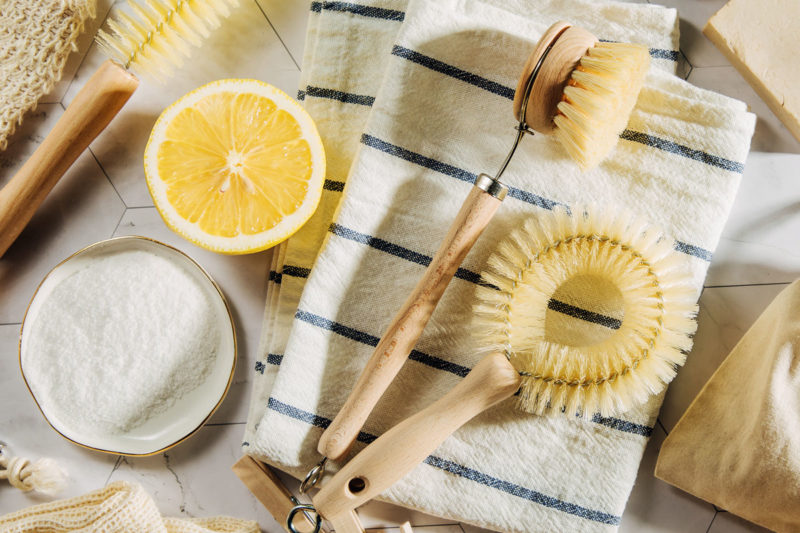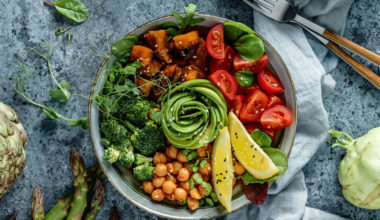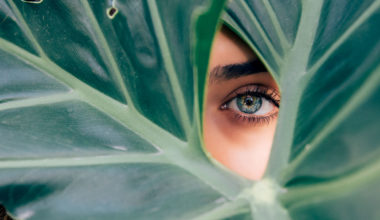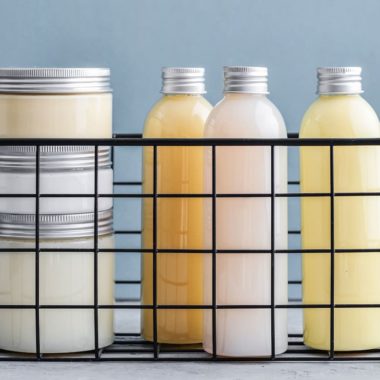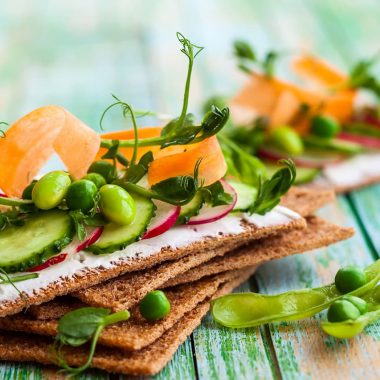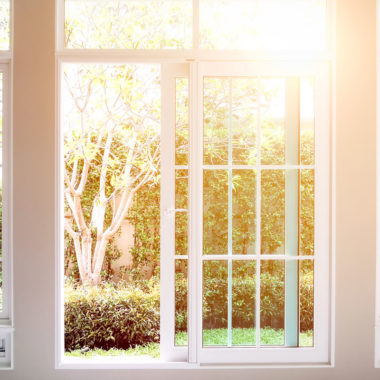Washing up liquid, window cleaner… All kinds of detergents contribute towards pollution because of their packaging, and also and especially because of their constituent chemicals that get released into the rinsing water. Whereas their natural counterparts are just as effective for household upkeep. Which upkeep products are clean and non-polluting for a cleaner planet? Check them out!
These days, there’s a vast array of options in the household products aisle. Lately, this has included many more eco-friendly products that are less harmful to the environment. And also (and especially), natural substances that make traditional household remedies the new must for a clean, healthy home. These household preparations of yore, which are more economical, are not polluting, unlike chemical formulations which can end up in the natural environment via the rinsing water (which can’t always be completely depolluted or treated) and which put the health of children and the whole family in jeopardy with their toxic fumes.
So welcome to the land of natural detergents, which are eco-friendly, effective and non polluting, to clean the whole house without impacting on the planet!
Bicarbonate of soda (or sodium bicarbonate)
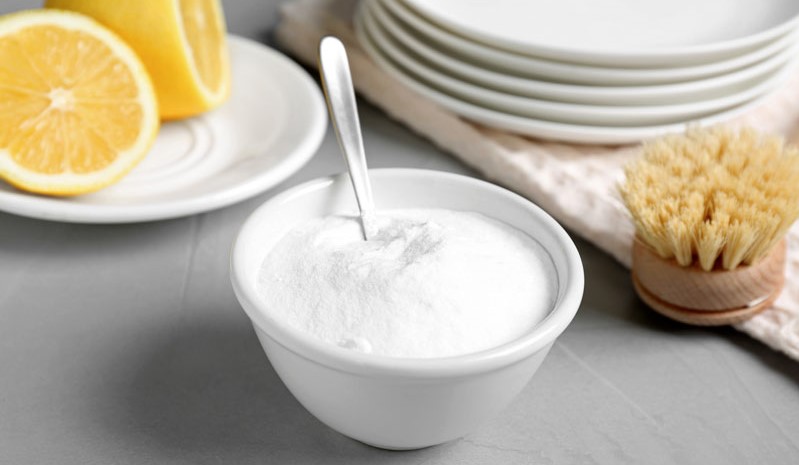
This multitasking powder, which you can get hold of just about anywhere, is a healthy, essential detergent for household upkeep. Use it to clean wash basins, sinks, bathtubs, tiles and toilets! Its deodorising power makes it a natural detergent that’s perfect for the oven, fridge and barbecue racks. It can also deodorise fabrics and rugs, as well as cat litter. It’s also an effective stain remover for fabrics. Apply to the stain, let it work for a while and place it in the drum before doing your laundry load. Alternatively, soak the stained area in a solution of bicarbonate of soda and water. The compound can also be used to clean garden furniture, cement or stone floors and outside walls, without polluting the ground. A top tip: a little bicarbonate of soda added to the water in a vase will make your flowers last longer.
Household alcohol
It’s the end of the road for that blue window cleaner that we all know so well. A rag moistened with household alcohol cleans perfectly without being polluting… And it’s cheap! It can be sprayed onto surfaces (door handles, fridge, toilet) to disinfect and clean them, thanks to its astringent proprieties. On tiles, mirrors, kitchen and bathroom floors! Handily, it evaporates quickly and doesn’t need rinsing. A top tip: household alcohol removes marker pen, felt-tip pen and ballpoint pen ink stains and the like from most surfaces. It can also be sprayed onto mattresses to cleanse and deodorise them, for a healthy home without polluting the environment.
Marseilles soap
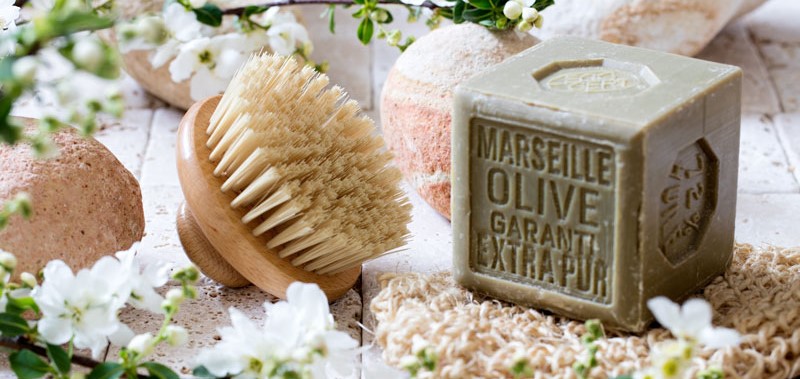
Marseilles soap [savon de Marseille] is natural and biodegradable, free of allergens, colourants and artificial additives. It’s the basic ingredient in eco-friendly household upkeep products, for cleaning surfaces and also for making your own laundry detergent.It’s very easy to make an eco-friendly version with Marseilles soap, soap nuts or Aleppo soap mixed with bicarbonate of soda. You’ll find recipes to follow on eco-friendly blogs. Genuine Marseilles soap is made from plant-based oils only, primarily olive oil. It’s advisable to buy it in the form of soap flakes that can be melted down. The green variant, which is made from olive oil with added coprah oil, is different to the white variant made form groundnut and/or palm oil. The latter is often produced at the cost of deforestation, and should be avoided. Be aware that with no appellation of origin, a great many products (sometimes made in China) go by this name without having the same ingredients or properties. “Extra pure” soap is made up of 72% purely plant-based oil, which must be shown on the product, and it must bear the name and brand of the soap factory where it was produced.
White vinegar
Diluted with water and fragranced with essential oils, it makes a very good replacement for fabric softener, and is a natural descaler for the washing machine! Because it’s a natural but powerful limescale remover. Just spray it on to watch it work without having any impact on waste water. White vinegar is eco-friendly and economical, and can be used on showers, wash basins and sinks, taps, in kettles, to descale your iron, and even toilets. It’s also very effective on windows spotted with dried raindrop marks and on mirrors, as well as for cleaning pots and pans. White vinegar should be either sprayed on or soaked in, depending on the amount of limescale or grime, and left to work for 15 minutes to a whole night. After washing up, it can also be added to the rinsing water for sparkling crockery and cutlery. In addition, it can be added to a bucket of water for mopping floors. Vinegar’s antimicrobial properties make it an effective eco-friendly detergent. It can be used to clean fridges, children’s toys (which can be left to soak in it) bathroom sealant (to prevent mould), or for deodorising pipes. Vinegar’s deodorising power means that it is also useful for treating fabrics that have absorbed the smell of perspiration, odour from pets, urine, wine, etc. And also to cleanse foul-smelling sponges or cleansing mitts.
Soap nuts
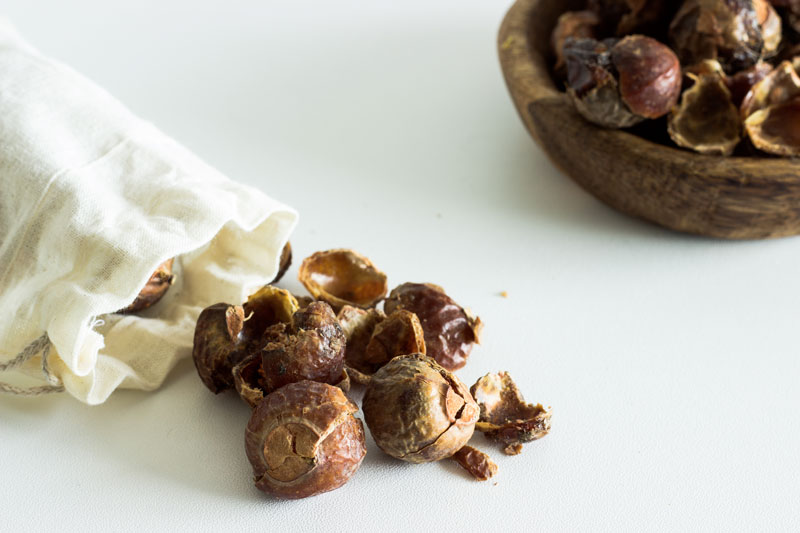
Their bark is used for the saponin that it contains, which is a natural detergent. Pop these nuts into the drum of the washing machine, and the laundry gets cleaned by their rubbing against the laundry as well as by the naturally-detergent substance contained in them. (Available for order on eco-friendly lifestyle sites)
Percarbonate of sodium
This solid version of oxygenated water is free from phosphorus and chlorine, but removes stains, whitens, disinfects and deodorises laundry by releasing active oxygen into the water. It’s perfect for removing stains before laundering or in addition to your DIY laundry detergent.
Montmorillonite [Terre de Sommières]
This powdered clay is surprisingly absorbent and as such, one of the best natural stain removers, and also neutralises odours. It’s advisable to always have some to hand in case you need to remove vomit or other bodily fluids from a carpet. After cleaning off the stain with soap and water, just sprinkle montmorillonite liberally on what is left and leave it to work for several hours. Then vacuum it up. This process can be repeated as needed. You can also put some in the steam iron’s water tank to deodorise fabrics.
Whiting [Blanc de Meudon]
This fine chalk, reduced to a white powder, contains calcium carbonate. Without being abrasive, it can clean any item without scratching it. Earthenware, plastic coatings, glass, marble, silver jewellery and silverware and even vitroceramic cooktops. Just mix it with a little water to make a paste, apply it to the item and clean it off with a soft cloth.
Essential oils
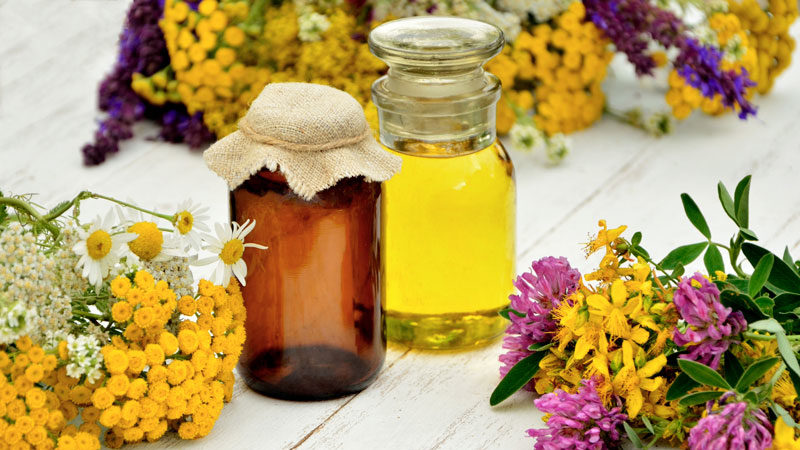
They can be used to fragrance all natural household upkeep products. Being naturally antibacterial, they make excellent cleaners to guard against mould formation. To be diluted with water in a spray bottle.
Lemon
There’s nothing more eco-friendly to clean and add sparkle without impacting on nature! It can be added to rinsing water, sprayed onto taps, etc. Plus, it’s a deodoriser and leaves a pleasant smell behind. Lemon is nothing but good news!
Coffee grounds
Perfect for deodorising – just place coffee grounds in a little dish and put it in the fridge or toilet as a substitute for chemical deodorisers.


